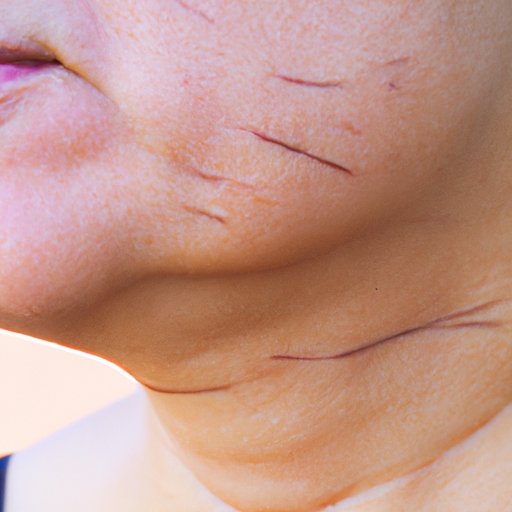Introduction
Growing hair on your chin as a woman can be an unexpected and unwelcome surprise. It can be embarrassing and confusing, leaving many women feeling frustrated and unsure of what to do. It’s important to understand why this is happening and what can be done to manage it.
In this article, we’ll explore the possible causes of female chin hair growth, how to manage unwanted chin hair, hormonal changes that can affect chin hair growth in women, and how to address any social stigmas surrounding female chin hair. We’ll also provide a guide for women on how to embrace their chin hair.

Exploring the Causes of Female Chin Hair Growth
There are several potential causes of female chin hair growth. These include hormonal imbalances, genetics, age, and certain medications.
Hormonal Imbalances
Hormonal imbalances can cause excess facial hair growth in women. This can happen due to fluctuations in hormones like estrogen and testosterone, or from conditions such as polycystic ovary syndrome (PCOS). PCOS occurs when the body produces too much of the hormone androgen, which can lead to an increase in facial and body hair.
Genetics
Genetics can also play a role in female chin hair growth. If your mother or grandmother had facial hair, you may be more likely to have it as well.
Age
As women age, their hormone levels can change, leading to an increase in facial hair. This is especially common during menopause, when estrogen levels decrease and testosterone levels increase. This can cause an increase in facial hair growth.
Medications
Certain medications can also cause an increase in facial hair growth in women. These include some birth control pills, steroids, and medications used to treat mental health conditions.
How to Manage Unwanted Chin Hair as a Woman
Once you’ve identified the cause of your chin hair growth, there are several ways to manage it. These include shaving, waxing, plucking, laser hair removal, and medication.
Shaving
Shaving is the most common way to remove unwanted chin hair. It’s quick and easy, but it needs to be done regularly to keep the hair at bay. Make sure to use a sharp razor and shave in the direction of hair growth to avoid irritation.
Waxing
Waxing is another option for removing chin hair. It’s more long-lasting than shaving, but it can be painful and cause irritation. Make sure to use a gentle wax and follow the directions carefully.
Plucking
Plucking is a great option for smaller areas of hair, like on the chin. It’s best to use tweezers specifically designed for facial hair removal and to pluck in the direction of hair growth.
Laser Hair Removal
Laser hair removal is a more permanent solution for unwanted chin hair. During the procedure, a technician uses a laser to target and destroy the hair follicles, resulting in permanent hair reduction. However, it can be expensive and may require multiple treatments.
Medication
If your chin hair growth is caused by a medical condition or medication, your doctor may prescribe medication to reduce the amount of hair. This may include birth control pills, antiandrogens, or other medications.
Understanding Hormonal Changes that Affect Chin Hair Growth in Women
Hormonal changes can play a major role in female chin hair growth. Here are some of the most common hormonal changes that can cause an increase in chin hair growth in women:
Menopause
During menopause, estrogen levels drop and testosterone levels rise, which can cause an increase in facial and body hair. This is known as hirsutism.
Pregnancy
Pregnancy can also cause an increase in facial and body hair. This is due to increased levels of hormones like estrogen and progesterone, which can stimulate hair growth.
Polycystic Ovary Syndrome (PCOS)
PCOS is a condition that affects up to 10 percent of women of reproductive age. It occurs when the body produces too much of the hormone androgen, which can lead to an increase in facial and body hair.
Stress
High levels of stress can also cause an increase in facial and body hair. This is due to the body releasing more of the hormone cortisol, which can stimulate hair growth.

Addressing Social Stigmas Surrounding Female Chin Hair
Unfortunately, there is still a stigma surrounding female chin hair. To help address this, it’s important to educate people on the causes of female chin hair growth and to normalize the presence of facial hair on women. Self-acceptance is also key. Women should feel empowered to embrace their chin hair without shame.

Embracing Your Chin Hair: A Guide for Women
Growing chin hair as a woman can be difficult to deal with, but it doesn’t have to be something to be ashamed of. Here are some tips for managing chin hair and embracing it:
- Choose the right method for you. Whether it’s shaving, waxing, plucking, laser hair removal, or medication, find a method that works for you.
- Be gentle. When removing chin hair, use a gentle touch to avoid irritation.
- Know your options. If you’re struggling with chin hair, talk to your doctor about available treatment options.
- Educate yourself. Learn more about the causes of female chin hair growth so you can understand why it’s happening.
- Normalize it. Help break down the stigma surrounding female chin hair by normalizing its presence.
- Be kind to yourself. Remember that you are beautiful and unique, chin hair and all.
There are also several resources available to help women manage and accept their chin hair. These include support groups, online forums, and articles with helpful information.
Conclusion
Female chin hair growth can be confusing and embarrassing, but it’s nothing to be ashamed of. By understanding the causes of female chin hair growth and exploring available management options, you can gain control of your chin hair. Additionally, it’s important to address any underlying issues that may be causing an increase in facial hair, such as hormonal imbalances or medications. Finally, don’t forget to embrace your chin hair and celebrate your unique beauty.


